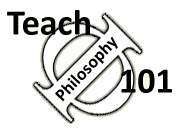Teach Philosophy 101
Free resources for
philosophy teachers!
"One of the most comprehensive, well-researched, and accessible guides for teachers that I have ever seen." James Lang, Chronicle of Higher Education (read full review of TΦ101)
Examples of Discussion Starters
Here are some suggested techniques for stimulating discussion.
-
Free writing at beginning of class. This technique simultaneously provides accountability on whether students have done the reading but also gets them thinking about topics they would like to discuss.
-
Reinforcement Strategies. Darby Lewes is the author of a very entertaining books called A Portrait of the Student as a Young Wolf, which attempts to deal with student motivation issues in terms of behavior modification techniques. Here is one idea: Lewes assigns points for class participation, with a maximum of two points per day. She comes to class with a bag of poker chips, and whenever a student makes a high-quality contribution, she gives the student one poker chip. For the next participation, the student gets a second poker chip, and has thus received maximum credit for that day. Those students then tend to hold back a little to let other students get their poker chips. She says it really works.
-
Plus, minus, question mark, lightning bolt. A good way John Immerwahr developed to help students summarize material after completing a text is to ask them to think about: things they liked about the text (plus), things they disagreed with (minus), questions they still have (question mark), and things that the text made them think about (lightning bolt). Draw on the board four columns. At the top of the first write a plus mark, a minus sign, a question mark, and a jagged line for a lightning bolt. Ask the students either working at their seats individually or preferably in pairs to develop four categories of ideas about the reading. After giving students sufficient time to come up with responses, ask for volunteers or call on students to share what they wrote down. Do not comment on individual responses. Once you have several responses on the board you can ask students to discuss those, group them, respond to them, or whatever.
-
Structuring a discussion in stages. Maughn Rollins Gregory, in her Teaching Philosophy article entitled "A Framework for Facilitating Class discussion," argues that discussion is most productive if it moves (loosely) through a series of structured stages, which are known in advance to the students. The faculty member's job is to guide the students to move through these stages. The stages are:
(1) Identify Issues Relevant to Purposes;
(2) Formulate and Organize Relevant Questions;
(3) Formulate and Organize Hypotheses in Response to Questions;
(4) Clarify and Test Hypotheses in Dialogue and Confirm, Revise or Abandon;
(5) Experiment with Hypotheses in Experience and Warrant, Revise or Abandon;
(6) Implement Warranted Hypotheses.
-
The Spiderweb approach to class discussion. Use the Spider Web Discussion Strategy (adapted from The Best Class You Never Taught by A. Wiggins) to explicitly practice with students how to participate in and assess their participation in discussions. A couple of rounds of this and students will be prepared for the discussions you have always dreamed of! These discussions create an opportunity for students to talk without looking to the teacher for answers. Here is a link to his book chapter on the spiderweb methodology.
In general, giving students an opportunity to structure their thoughts or respond to concrete questions in relation to the text will generate the best discussions. And, of course, finding a way to actually get them to read the text before class is critical to class discussion. See our section on Reading Assignments.
Sources
Gregory, Maughn Rollins. "Facilitating Classroom Dialogue." Teaching Philosophy. 30.1 (2007): 59-84.
Lewes, Darby. A Portrait of the Student as a Young Wolf: Motivating Undergraduates. Folly Hill, 2003.
Wiggins, Alex. The Best Class You Never Taught. ASCD.
Author: John Immerwahr
Update: Nov. 2, 2015 (E. Tarver); 11/24/2025--David Sackris
